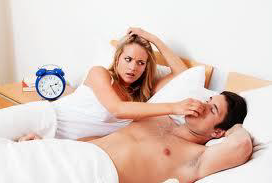
What it is sleep apnoea?
It is estimated that about five percent of Australians have obstructive sleep apnoea (sleep apnoea). It is more common amongst males with around a quarter of Australian men over the age of 30 years affected.
Sleep apnoea occurs when the walls of the throat collapse during sleep, blocking the upper airway and causing the person to stop breathing. Breathing can stop from between a few seconds to almost a minute. Breathing starts again when the brain registers a drop in oxygen levels or a lack of breathing. The brain sends a message to the nervous system causing the person to wake slightly which opens the upper airway. The person will then usually snort or gasp for breath and then fall back to sleep. This situation can occur hundreds of times during the night and most affected people don’t even realise it is happening. As you can imagine, people with sleep apnoea can feel very tired in the morning and throughout the day. This can affect their concentration, memory and work performance.
Another rare type of sleep apnoea is called central sleep apnoea, caused by a disruption to the nerve messages sent between the brain and the body.
Symptoms of sleep apnoea
Some symptoms that may indicate a person has sleep apnoea are:
Daytime sleepiness, fatigue, tiredness
Poor concentration
Poor memory
Irritability and mood changes
A need to go to the toilet frequently at night
Impotence and reduced sex drive.
The severity of sleep apnoea
The severity of sleep apnoea depends upon how often a person stops breathing whilst they are asleep.
Normal – less than five breathing interruptions per hour
Mild sleep apnoea – between 5 and 15 breathing interruptions per hour
Moderate sleep apnoea – between 15 and 30 breathing interruptions per hour
Severe sleep apnoea – over 30 breathing interruptions per hour.
Causes of sleep apnoea
Obesity is the most common cause of sleep apnoea. It is well known that a 5-10% decrease in a person’s body weight can significantly reduce the severity of their sleep apnoea.
Alcohol consumption (mostly during the evening) can also contribute to the severity of sleep apnoea. Alcohol can relax the throat muscles and abnormally collapse the upper airway. It can also reduce the arousal response during sleep.
Medical conditions such as hypothyroidism, nasal congestion and large tonsils can also cause sleep apnoea. Medications such as sleeping tablets and sedatives can be another cause as they can relax muscles including the throat muscles.
Its effects on health
Individuals with sleep apnoea can experience symptoms ranging from mild to severe. Those with sleep apnoea often wake up in the morning still feeling very tired. This results in poor concentration, poor memory and poor work performance. Sleep apnoea can result in mood changes, irritability and even behavioural disorders. It can also contribute to headaches and heart burn. Furthermore, the lack of oxygen can cause impotence and a reduced sex drive.
More severe sleep apnoea can cause increased blood pressure which increases the risk of heart attacks and strokes. People with sleep apnoea are also at increased risk of accidents as a result of their fatigue.
Treatments for sleep apnoea
When a doctor suspects a person may have sleep apnoea, they will be referred to a sleep specialist. The sleep specialist will organise a sleep study to determine whether they have sleep apnoea and if so, its severity. The sleep specialist will then make recommendations as to how the condition should be treated. For example, hypothyroidism and large tonsils can be treated and corrected medically.
Weight loss and reduced alcohol consumption are the major lifestyle changes required to treat sleep apnoea. Dietitians can provide advice and strategies to help people with sleep apnoea make these changes and eliminate or reduce the severity of their sleep apnoea.
Depending upon the severity of the sleep apnoea, sleep specialists also often prescribe a mask attached to a nasal continuous positive airway pressure (CPAP) machine to treat sleep apnoea. The mask keeps the back of the throat open by forcing air through the nose. A mouthguard to hold the jaw forward during sleep can also be used to treat mild to moderate sleep apnoea.
Nose and throat surgeries are not always effective but may be suggested when other therapies fail.
